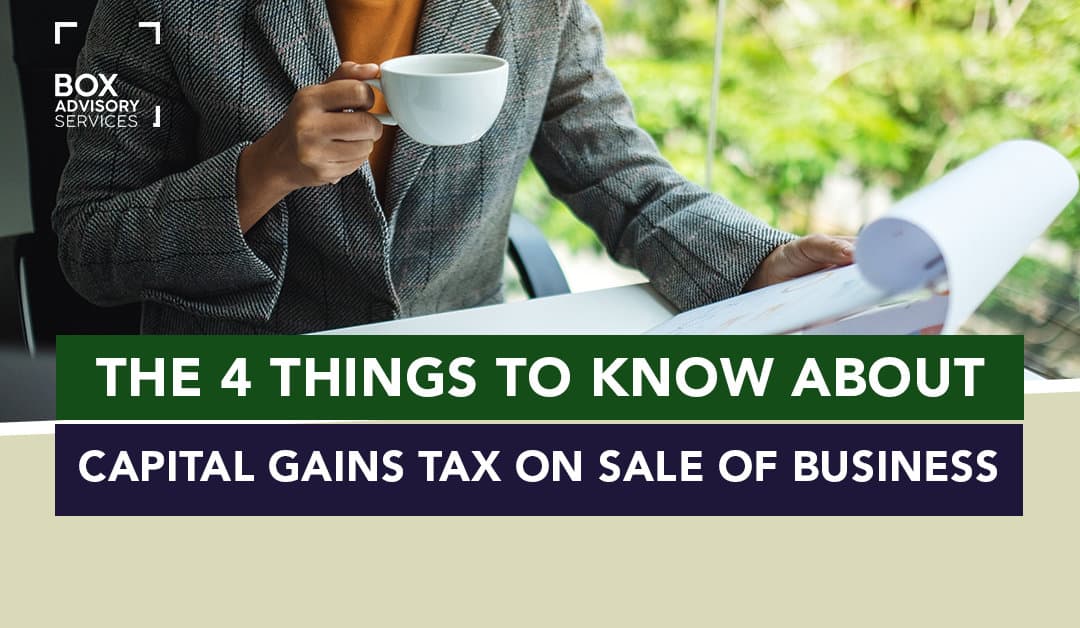
BY
|
The 4 Things to Know About Capital Gains Tax on Sale of Business
It’s no secret that capital gains tax (CGT) is a complicated topic.
In fact, CGT can be one of the most confusing taxes for business owners to understand and usually last on the list of considerations when selling a business.
But, there are many things to consider when you’re looking to sell your company, including capital gains tax and how to take advantage of the available CGT concessions.
So, here are four things you need to know about capital gains tax on the sale of the business.
1. You Have To Pay Tax On Any Capital Gain
While this may seem like an obvious point, many business owners remain unaware that the sale of their business is considered a CGT event.
In other words, if you make a profit on the sale of your business, you trigger CGT liability.
This is because any income-producing assets such as property or shares have an assessable capital gain if the owners profit from the sale of that asset.
To find out more about capital gains tax and how it’s calculated, make sure to check out these three simple methods.
2. There’s a Difference Between Selling Business Assets and Company Shares
As a business owner, when you sell your business, you can choose to either sell your business assets or company shares:
- Company share sale: the purchaser buys 100% of the shares in the company, essentially becoming the legal entity’s new owner – so the business will continue operating.
- Business asset sale: the purchaser buys the business’s assets such as property, trademarks and plant and equipment assets.
It’s important to distinguish between what kind of sale you’re undertaking because you could end up paying more CGT on one compared to the other.
For example, business owners who opt for an asset sale generally can’t access a CGT discount unless these additional conditions are met.
However, there are several factors to consider when establishing whether a share sale or asset sale is a suitable strategy for your business. So, make sure to consult a financial advisor or tax agent when navigating the sale of your business.
3. CGT Concessions Can Help You Reduce Your Capital Gain
The Australian Taxation Office (ATO) offers small businesses the opportunity to reduce the burden of paying capital gain arising from the sale of their business.
Claiming these small business concessions could help you minimise the amount of tax you’re liable to pay:
- 50% CGT discount: individual business owners, sole traders and trusts are entitled to a 50% CGT discount if they have owned the business for more than 12 months before the sale of the business entity.
- The 15-Year Exemption: if you’ve continuously owned your business for 15 years before its sale, you can be exempt from capital gains tax altogether – making this the most generous CGT concession offered by the ATO.
- 50% Active Asset Reduction: your business will be considered an “active asset” if it’s been operative for at least half the time that you’ve owned it. You’ll be entitled to a 50% reduction on the capital gains tax on the sale of your business if your business is deemed an active asset. The 50% active asset reduction is in addition to the 50% CGT discount.
- Retirement Exemption: applying for the CGT retirement exemption will allow you to set aside up to $500,000 of your capital gain. If you’re above the age of 55 years when you sell your business, you gain access to the concession immediately. However, if you’re below the age of 55 years, you’ll need to pay the exempt amount into a superannuation fund or retirement savings account.
- Small Business Rollover: you can choose to set aside the capital gain for up to two years until you buy replacement capital assets or make capital improvements to an existing asset. Essentially the deferred capital gain will be used to reduce the cost base of the replacement asset.
If you would like a more comprehensive breakdown of the small business concessions and how to pay capital gains tax, make sure to check out these examples.
4. You Aren’t Automatically Eligible for CGT Concessions
Before you claim any of the small business CGT concessions listed in point three, you need to first establish if you qualify.
The ATO has set several primary conditions to help you establish your eligibility. You may qualify for one or more of the small business concessions if you meet the following criteria:
- according to your income tax assessment, your small business turns over less than $2 million each year, or the total value of your net assets and related entities doesn’t exceed $6 million, and
- the asset being sold is an active asset (in other words, the asset is being used for business purposes).
Your business (or its assets) is considered an active asset if:
- you have owned it for more than 15 years and have actively used it as part of your operations for at least half of those years (i.e. 7.5 years), or
- you have owned it for 15 years or less and have used it to carry out business for at least half of those years.
Key Takeaways
If you’re in the process of selling your business, it can be confusing to know how CGT will affect you.
You need to keep in mind a few things so that you don’t end up paying more capital gains tax than you need to. First off, there is a difference between what counts as ‘business assets’ (things like equipment) versus what counts as ‘company shares’.
Concessions may help reduce the amount of capital gain you need to report on when selling your business. However, not all businesses have access to these concessions – you need to meet the eligibility criteria set by the ATO.
You’ll also need to consider consulting an accountant or business advisor for more information about how each concession works and whether or not it might be able to benefit you when it comes time for the sale of your business. With the right accountant, you may be able to reduce your capital gains tax to zero!
At Box Advisory Services, our team of small business accounting experts are committed to making sure that you’re able to make the most of the small business CGT concessions and other benefits that may be available to you.
If you would like to find out if you qualify for one of these concessions, book your free consultation with us today!
Disclaimer:
Please note that every effort has been made to ensure that the information provided in this guide is accurate. You should note, however, that the information is intended as a guide only, providing an overview of general information available to property buyers and investors. This guide is not intended to be an exhaustive source of information and should not be seen to constitute legal, tax or investment advice. You should, where necessary, seek your own advice for any legal, tax or investment issues raised in your affairs.



